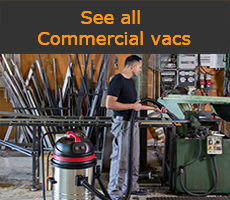Choosing a Commercial Vacuum Cleaner
The B&G guide to choosing the right vacuum cleaning equipment
Commercial vacuum cleaners have a vital role to play in combating dust and dirt in all types of workplace, and whilst the basic principles of commercial vacuums are similar to the domestic machines we’re all familiar with, they are usually bigger / more robust and many are capable of performing a variety of different tasks. There are several types or commercial vacuum, from upright to tub and also backpack vacs, and of course a range of other types suitable for commercial use. It’s important to use the type of vacuum best suited to your needs, so what should you think about?
How vacuum cleaners work
Vacuum cleaners are powered by a motor, with a fan to suck air and dirt into the machine, trapping the dirt using a filter (or filters) and then pushing the cleaner air out again. Quite straightforward in principle, but the suitability of a vacuum (or suction) cleaner is determined by a number of factors:
Vacuum or suction power
The amount of suction power you need will depend largely on the type of dirt being collected. Lighter, finer dust requires a greater air flow but less suction whereas heavier or tougher deposits need a stronger suction.
What type of dirt do you need to vacuum?
Most vacuums can cope with any type of dry dirt, but liquid dirt and spillages require the use of a wet and dry vacuum cleaner. Fortunately there are several to choose from which can easily be switched from dry to wet operating mode, so they can be used for both types.
Volume
The airflow, or vacuumed air volume, is the result of the average air speed multiplied by the hose diameter. So, the narrower the suction hose, the less air volume there will be but the vacuum power will be greater. Airflow is usually measured in litres per minute, and larger machines can move 000’s of litres per minute.
Vacuum motor power
Generally speaking, vacuums with higher wattage motors have more sucking power. Commercial and professional vacuums such as those featured in our commercial and industrial vacuum cleaner category have a wide range of motor power, but as with most things in life, size isn’t everything, and the efficiency of the machine is determined by the quality of engineering, it’s suitability for purpose and also how well it is maintained.
Battery powered vacs for commercial use
We’re all familiar with the small hand-held battery vacs often used for cleaning out the car, however the recent advances in battery technology mean that lithium battery powered vacs can now be used for commercial “daily cleaning” purposes, with longer running times and equivalent power levels to standard machines. Perfect for use where trailing cables could be a hazard, or whether there is no available power source, battery powered vacs tend to be very quiet too, take a look at the Karcher Vacuum Cleaner T9/1 BP for example.
Backpack vacuum cleaners
Another step forward is the introduction of backpack vacuums, ideal for use in confined areas like buses, trains and care homes. Designed to be lightweight, easy and comfortable to carry, backpack vacs like the Truvox VBPiie have single-handed tool operation, so operators can move obstacles and pick up litter at the same time as vacuuming.
Collection Tank
Most commercial machines collect the dirt in a tank, so the size of the tank could be relevant to you. If you’re vacuuming up a lot of fine dust, it will probably take some time to fill the tank, but larger dirt and debris can fill a tank very quickly. So think about how much dirt you are vacuuming up and how often you want to empty the tank, because a full tank will result in poor suction. Tanks are typically made from stainless steel, a good all round material, resistant to mechanical abrasion. However, where there are aggressive chemicals to be removed, a Polypropylene (PP) vessel should be used.
Vacuum noise level
“Low noise” vacs are becoming quite the norm now and we feature several professional vacuums suitable for contract cleaning, which have sound levels under 80dB. For operator comfort and safety, and also for vacuuming in shops, hotels, hospitals and other public areas, low noise machines are a good choice.
Filter system
For ease of use and efficiency, a vacuum cleaner with an efficient filter system which will minimise clogging and be easy to keep clean. Some commercial vacuums, like the Nilfisk VP300 have certified High Efficiency Particulate Air (HEPA) filters, which collect the smallest particles, helping to maintain a high air quality in dust sensitive areas.
Vacuums for flammable or hazardous dust
Industrial safety vacuums are available to safely remove flammable dust and hazardous substances such as asbestos. For example the Karcher NT75 industrial safety vacuum.
Need help choosing the best commercial vacuum cleaner for your needs?
As one of the UK’s leading cleaning equipment suppliers, we have a wealth of experience to draw on, so please ask us for advice about your cleaning requirements to make sure you get the right vacuum cleaner, at the right price.


